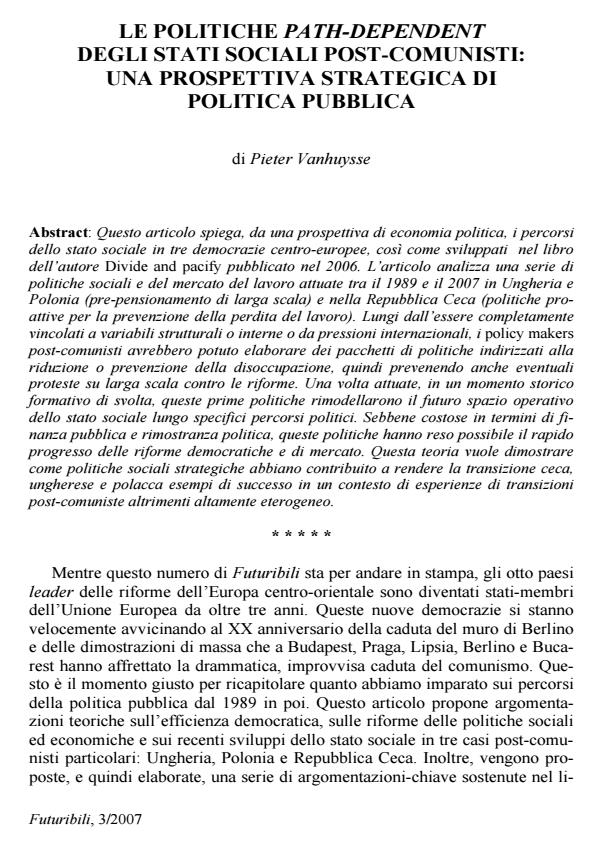Le politiche path-dependent degli stati sociali post-comunisti: una prospettiva strategica di politica pubblica
Titolo Rivista FUTURIBILI
Autori/Curatori Pieter Vanhuysse
Anno di pubblicazione 2008 Fascicolo 2007/3 Lingua Italiano
Numero pagine 24 P. 81-104 Dimensione file 167 KB
DOI
Il DOI è il codice a barre della proprietà intellettuale: per saperne di più
clicca qui
Qui sotto puoi vedere in anteprima la prima pagina di questo articolo.
Se questo articolo ti interessa, lo puoi acquistare (e scaricare in formato pdf) seguendo le facili indicazioni per acquistare il download credit. Acquista Download Credits per scaricare questo Articolo in formato PDF

FrancoAngeli è membro della Publishers International Linking Association, Inc (PILA)associazione indipendente e non profit per facilitare (attraverso i servizi tecnologici implementati da CrossRef.org) l’accesso degli studiosi ai contenuti digitali nelle pubblicazioni professionali e scientifiche
Path-dependent policies in the post-Communist welfare states: A strategic perspective on public policy From the point of view of economic policy, this article explains the paths followed by the welfare state in three central European democracies, as traced by the author in his book Divide and Pacify (2006). It focuses on social and employment policies implemented between 1989 and 2007 in Hungary and Poland (large-scale early retirement) and in the Czech Republic (pro-active policies to prevent job losses). Far from being hidebound by internal structural variables or international pressure, post-Communist policy-makers were able to devise policy packages designed to reduce or prevent unemployment and so forestall any large-scale protest against reforms. Implemented at a crucial historical juncture, these initial policies reshaped the future operational space of the welfare state along specific political lines. Though costly in terms of public funding and political resistance, these policies paved the way for the rapid progress of democratic and market reforms. This analysis is designed to demonstrate how strategic social policies helped to make the Czech, Hungarian and Polish transformations examples of success in a context of markedly varied experiences of post- Communist transformation.;
Pieter Vanhuysse, Le politiche path-dependent degli stati sociali post-comunisti: una prospettiva strategica di politica pubblica in "FUTURIBILI" 3/2007, pp 81-104, DOI: